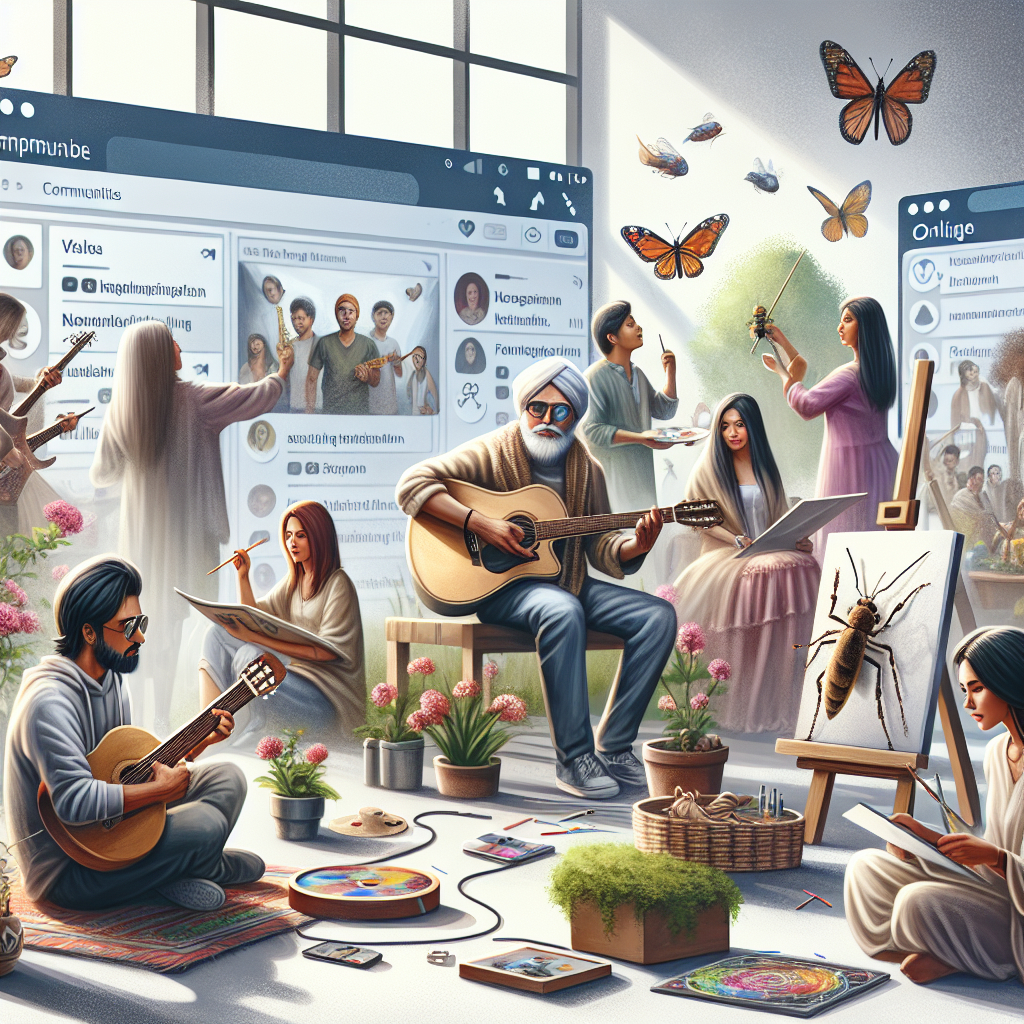Online communities have become a cornerstone for individuals seeking to explore and deepen their hobbies and interests. These digital platforms offer a unique space where like-minded people can connect, share knowledge, and provide support, regardless of geographical boundaries.
The Evolution of Online Communities
The concept of online communities has evolved significantly over the years. Initially, these communities were simple forums or chat rooms where people could discuss specific topics. However, with the advent of social media and advanced web technologies, online communities have transformed into dynamic, interactive spaces that cater to a wide range of interests.
One of the key factors driving this evolution is the increasing accessibility of the internet. With more people gaining access to high-speed internet and smart devices, the potential for creating and participating in online communities has expanded exponentially. Platforms like Reddit, Facebook Groups, and specialized forums have made it easier than ever to find and join communities that align with one’s hobbies and interests.
Moreover, the rise of multimedia content has enriched the experience of participating in online communities. Users can now share videos, images, and live streams, making interactions more engaging and informative. This multimedia approach has proven particularly beneficial for hobbies that require visual or auditory elements, such as cooking, music, and crafting.
Benefits of Joining Online Communities
Joining an online community offers numerous benefits, especially for those looking to delve deeper into their hobbies and interests. One of the most significant advantages is the access to a wealth of knowledge and resources. Members of these communities often share tips, tutorials, and advice that can help others improve their skills and knowledge.
For instance, a photography enthusiast can join a community where professional photographers share their techniques and experiences. This not only provides valuable insights but also inspires beginners to experiment and grow. Similarly, a cooking community can offer recipes, cooking tips, and even live cooking sessions, making it easier for members to learn and try new dishes.
Another major benefit is the sense of belonging and support that online communities provide. Engaging with people who share similar interests can be incredibly motivating and reassuring. Members often celebrate each other’s achievements, offer constructive feedback, and provide emotional support during challenging times. This sense of camaraderie can be particularly uplifting for individuals who may not have access to such support in their offline lives.
Additionally, online communities can serve as a platform for collaboration and networking. Many communities organize events, challenges, and projects that encourage members to work together. This collaborative spirit can lead to the creation of new ideas, products, and even lifelong friendships. For example, a group of writers in an online writing community might collaborate on an anthology, or a team of gamers might form a competitive esports team.
Challenges and Considerations
While online communities offer numerous benefits, they also come with their own set of challenges and considerations. One of the primary concerns is the issue of privacy and security. Sharing personal information and engaging with strangers online can pose risks, such as identity theft, cyberbullying, and online harassment. It is crucial for members to be aware of these risks and take necessary precautions, such as using strong passwords, enabling two-factor authentication, and being mindful of the information they share.
Another challenge is the potential for misinformation and low-quality content. Not all information shared in online communities is accurate or reliable. Members should critically evaluate the sources of information and cross-check facts before accepting them as truth. Moderators and community leaders play a vital role in maintaining the quality of content and ensuring that discussions remain respectful and constructive.
Moreover, the dynamics of online communities can sometimes lead to conflicts and disagreements. Diverse opinions and perspectives are inevitable, and while healthy debates can be productive, they can also escalate into heated arguments. Effective moderation and clear community guidelines are essential to manage conflicts and maintain a positive and inclusive environment.
Case Studies: Successful Online Communities
Several online communities have successfully created supportive and engaging environments for their members. One notable example is the subreddit r/fitness, which has become a go-to resource for fitness enthusiasts. The community offers workout plans, nutrition advice, and motivational stories, helping members achieve their fitness goals. The subreddit is well-moderated, ensuring that the content remains relevant and respectful.
Another example is the online platform Ravelry, dedicated to knitting and crocheting. Ravelry provides a space for crafters to share patterns, showcase their projects, and connect with others who share their passion. The platform also offers tools for organizing and tracking projects, making it a valuable resource for both beginners and experienced crafters.
In the realm of gaming, the Discord server for the game „Among Us” has created a vibrant community where players can find others to play with, share strategies, and participate in events. The server’s moderators actively engage with members, organize activities, and ensure that the community remains welcoming and inclusive.
Future Trends in Online Communities
As technology continues to advance, the future of online communities looks promising. One emerging trend is the integration of virtual and augmented reality (VR/AR) into online communities. These technologies have the potential to create more immersive and interactive experiences, allowing members to engage with each other in virtual environments. For example, a VR-based art community could enable members to collaborate on virtual canvases in real-time.
Another trend is the increasing use of artificial intelligence (AI) and machine learning to enhance community management and personalization. AI-powered tools can help moderators identify and address issues more efficiently, while machine learning algorithms can provide personalized content recommendations based on members’ interests and activities. This can lead to more tailored and engaging experiences for community members.
Furthermore, the rise of decentralized platforms and blockchain technology could revolutionize the way online communities are governed and monetized. Decentralized platforms offer greater transparency and control to community members, reducing the influence of centralized authorities. Blockchain technology can also enable new models of value exchange, such as token-based economies, where members are rewarded for their contributions to the community.
Conclusion
Online communities play a crucial role in supporting individuals’ hobbies and interests. They provide a wealth of knowledge, a sense of belonging, and opportunities for collaboration and networking. While there are challenges to consider, the benefits of participating in online communities far outweigh the drawbacks. As technology continues to evolve, the potential for online communities to enrich our lives and connect us with like-minded individuals will only grow. Whether you are a seasoned enthusiast or just starting to explore a new hobby, there is likely an online community out there waiting to welcome you.



